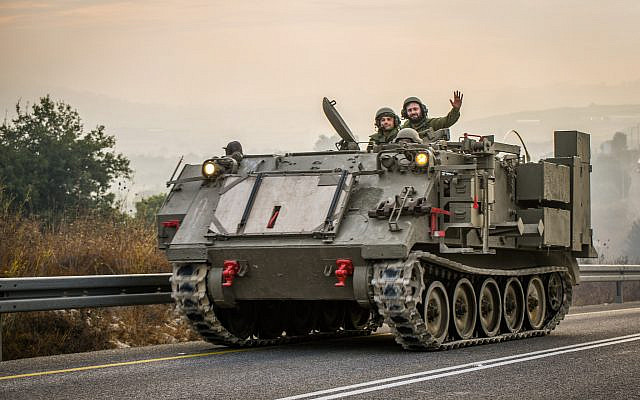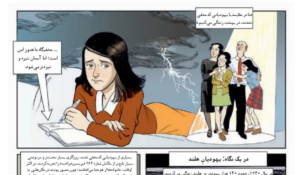Will my future grandchildren remember the day of terror the way I remember Kristallnacht?
This time, it’s different
Jewish history can feel repetitive: The same devastating story of violence for generations, in a world with no home for the Jews. Israel changed that
Oct 10, 2023, 11:49 AM

Nothing could have prepared me for the images and videos that began streaming in from the south of Israel the last few days.
Many of us, including me, choked back a rising hysteria when we saw Hamas terrorists celebrating their infiltration into Israel.
We’re watching genocide in real-time.
They say this is the most Jews killed in one day since the Shoah and the numbers keep growing.
October 7, 2023 will be forever imprinted on the timeline of Jewish history.
And right now, we are fighting to survive.
* * *
For the last two and half years, I have been intensely writing a book that gave me the opportunity to research and reflect on some of the most violent and disturbing episodes in Jewish history. Patterns and themes of Jewish continuity and survivor-hood always come after the eruption of violence.
We are not strangers to pogroms. For many of us Jews, no matter the part of the world our families traversed, our narratives, trajectories, and even sometimes DNA have been tampered by the experience. For those unfamiliar with the term, a pogrom can be defined as, “slaughter, massacre, persecution.”
In my writing last year, I wrote a story about a pogrom. Based on all the research I had, I told it faithfully, and though I spent weeks stressing about the exact time and location of the narrative, I now realize those details didn’t even matter. The subject matter was the same; women begging for their children’s lives and their own, swept away, and raped. The elderly being cut down where they stood. Buildings burning. Babies murdered. Lifeless bodies in the streets.
Watching the videos and images and hearing the stories as the news poured in this weekend, I was watching it come to life. And then I remembered that at the time of writing, the words just flew right out of me in a storm, the images of my story were just there in my mind, as if I had seen them, read them, or imagined them hundreds of times before. Likely because in so many points of Jewish history, this scene is almost exactly the same. All my research pointed to the same moments over and over again. These are scenes that have shaped us and even sometimes defined the experience of Jewish survival-hood or victimhood, depending on your view.
Actually, writing through Jewish history sometimes felt repetitive, and I was vexed when explaining to my writing partners that I was afraid my readers would get retraumatized by reading the same devastating narrative time and time again. The consequences of crisis in a world without a place of Jewish sovereignty.
But isn’t that how it has been? Thinking back on our family stories, our Jewish intergenerational trauma — whether your family traveled through Furth, Vienna, Prague, Belarus, or Moscow like mine — or Baghdad, Berlin, Lodz, London, Addis Ababa, Marseille, NYC, Jerusalem, or anywhere else on this planet…. If we all sat down at a Pesach seder and talked through the tragedies that moved us around the world, led us through exile, or determined who we would become, what languages we would speak, and the memories that would haunt us, I imagine the stories would be striking in their similarities.
But when we retell this story of this moment in time, I believe and pray we will have a different ending.
The difference is that now we Jews are living in our indigenous land, on a new trajectory of our historical timeline. We face different terms, conditions, and directions.
Now we tell new stories.
* * *
Last week, I was I was researching the time period of the destruction of the Second Temple and the Bar Kochba revolt. Many historians say that this period was the end of Jewish sovereignty in the region of Judea until the War of Independence in 1948.
In between those two dates of 136 CE and 1948, when living in exile, when we were hit with a pogrom, we had very little agency. If you survived, most of the time you picked yourself out of the shambles of the life you once knew, and you moved on somewhere new to start a new life. Hence, most of our ancestors (and even many of us in our generation) were either immigrants or refugees.
The fear of the murderous side of antisemitism (born from insidious slander and propaganda targeting Jews) has been a prism through which the Jewish experience is projected; so many of us see the world and our own safety in it through its lens.
But the thing is, we just can’t forget that things are different now. They have to be.
Because what is still relatively new in the history of the Jewish people is our sovereignty once again in our land.
Our flawed, divisive, confusing, vexed, holy, hopeful, and human Jewish sovereignty.
And with that come many complications of leadership, and also the ability to respond to violence against our people.
October 7, 2023 was a disaster of historical proportions and we will be asking questions about it for the next 100 years.
But by October 8, 2023 there were over 300,000 reservists called up for war, dressed in their fatigues, leaving from synagogue on one of the most joyous days of the year, to respond.
To fight back.
I don’t know how this particular story ends, as we are writing history right now.
But I know that as so many Jewish stories begin and end the same way, and one major difference here is that our story began differently than pre-’48 stories. It’s a different trajectory. We have been operating on a fresh historical timeline since the War of Independence that offered us survival and self-determination and all the complicated humanity that comes along with sovereignty.
So now we fight back, with humility, anger, morality, fear, and faith.
We need to recover from the shock of this horror.
We need to grieve our people who have been murdered.
We need to reclaim the bodies and souls that have been literally stolen from us.
We need to beg the heavens to rain down miracles and protection for us all.
God, please don’t hide Yourself from us.
So that we can live on to write the next story of Your epic, enduring, and everlasting people.
About the Author
Shira Lankin Sheps is a writer, photographer, and clinically trained therapist. She is the creator and publisher of The Layers Project Magazine, an online magazine that explores in-depth insights into the challenges and triumphs of the lives of Jewish women. She is passionate about creating spaces for stories that need to be told and changing the dialogue around stigmatized topics. Her first book is “Layers: Personal Narratives of Struggle, Resilience, and Growth From Jewish Women,” published by Toby Press in 2021. Shira lives in Jerusalem with her husband and children.




